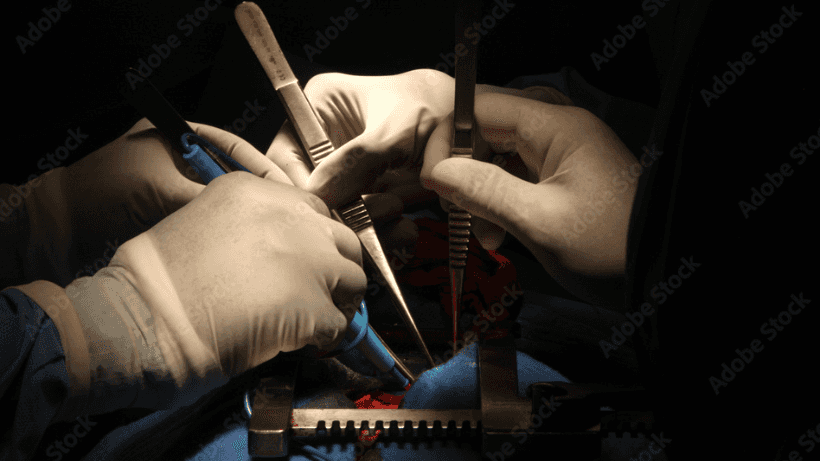
Heart Tumor Removal Surgery: Restoring Cardiac Health
28 Sep, 2023
 Healthtrip Team
Healthtrip TeamToday we're going to talk about heart tumor removal surgery. It's a topic that might sound a bit intimidating, but we'll break it down step by step.
First, what is a heart tumor? Well, just like in other parts of the body, a tumor in the heart is an abnormal growth of cells. These growths can be benign (non-cancerous) or malignant (cancerous). Either way, they can cause problems because the heart needs to work properly to pump blood throughout our bodies.
Most popular procedures in India
Heart tumor removal surgery is done to remove tumors from the heart that can interfere with its normal function and pose health risks, including the potential for heart failure or the spread of cancer.
So, why do we need surgery to remove these tumors? The purpose is quite simple: to restore the heart's normal function. When a tumor interferes with the heart's pumping action or causes other complications, it becomes essential to remove it.
Wellness Treatments
Give yourself the time to relax
Lowest Prices Guaranteed!

Lowest Prices Guaranteed!
Procedure for Heart Tumor Removal Surgery
Alright, let's get into the nitty-gritty of what happens during heart tumor removal surgery.
For benign heart tumors, surgery can cure the tumor in up to 95% of cases.
For malignant heart tumors, surgery can improve survival rates by up to 20%.
A. Pre-operative Preparation
- Consultation with a Cardiac Surgeon
- Before the surgery, you'll meet with a cardiac surgeon who specializes in these procedures. They'll explain the entire process and answer your questions. It's crucial to discuss any concerns you have during this consultation.
- Diagnostic Tests
- You'll undergo a series of tests to ensure a comprehensive understanding of the tumor's location, size, and type. These tests may include echocardiograms, CT scans, MRIs, or even cardiac catheterization.
- Medication Review
- Your medical history and current medications will be reviewed to ensure they won't interfere with the surgery. Sometimes, adjustments or temporary discontinuation of certain medications might be necessary.
- Fasting and Hydration
- Typically, you'll be asked to fast for a specific period before surgery. This helps prevent complications during anesthesia. Staying well-hydrated is also crucial to prepare your body for the procedure.
B. Surgical Steps
- Anesthesia Administration
- When it's time for the surgery, you'll be given anesthesia to ensure you're completely asleep and pain-free throughout the procedure. The type of anesthesia used will depend on the surgical approach and your overall health.
- Incision
- A carefully planned incision is made, usually on the chest. The size and location of the incision depend on the tumor's location. The goal is to provide the surgeon with the best possible access to the heart.
- Tumor Identification
- Once inside, the surgeon will identify the tumor. This can be a delicate process because they need to be precise in locating and assessing the tumor's characteristics.
- Tumor Removal
- Here's where the heart of the matter is: the removal of the tumor. The surgeon will employ various techniques, which may include cutting, excising, or using specialized instruments to remove the tumor. The goal is to take out as much of the tumor as possible while preserving healthy heart tissue.
- Reconstruction (if necessary)
- In some cases, the surgeon may need to repair or reconstruct damaged heart tissue after tumor removal. This step is critical for restoring the heart's proper function.
C. Post-operative Care
- Monitoring
- After the surgery, you'll be closely monitored in the recovery room and then in the intensive care unit (ICU) for a period of time. Monitoring includes checking vital signs, heart function, and overall recovery progress.
- Pain Management
- Managing pain is essential for your comfort and recovery. Pain medications will be administered as needed to ensure you're not in discomfort.
- Rehabilitation
- Once you're stable, you'll begin a rehabilitation program to help you regain strength and mobility. This may involve physical therapy, breathing exercises, and gradually increasing your activity level.
And there you have it, the step-by-step process of heart tumor removal surgery. It's a complex procedure, but with careful preparation and skilled surgeons, it can lead to positive outcomes.
Tips for preparing for heart tumor removal surgery
- Communicate openly with healthcare providers.
- Make lifestyle changes to improve overall health.
- Mentally prepare and seek emotional support.
- Establish a reliable support system for both before and after surgery.
Latest Advancements in Heart Tumor Removal Surgery
A. Minimally Invasive Techniques
- Robotic-assisted Surgery
- Robotic-assisted surgery is a cutting-edge approach that allows surgeons to perform intricate procedures with enhanced precision and control.
- Tiny robotic arms equipped with surgical instruments are inserted through small incisions, reducing the invasiveness of the procedure.
- Robotic systems provide a 3D view and fine-tuned movements, making it ideal for delicate heart tumor removal.
- Catheter-based Procedures
- Catheter-based techniques have revolutionized the treatment of certain heart tumors.
- In these procedures, a catheter (a thin, flexible tube) is guided through blood vessels to the heart.
- Minimally invasive tools like radiofrequency ablation or embolization can be used to treat tumors without the need for open-heart surgery.
B. Imaging and Navigation Technology
- 3D Printing for Surgical Planning
- 3D printing technology allows surgeons to create precise, patient-specific models of the heart and tumors.
- Surgeons can use these models for detailed pre-operative planning, enabling them to anticipate challenges and optimize their surgical approach.
- Intraoperative MRI and CT Scans
- Real-time imaging during surgery is becoming increasingly common.
- Intraoperative MRI and CT scans provide immediate feedback to surgeons, helping them verify the success of tumor removal and make adjustments if needed.
C. Targeted Therapies
- Immunotherapy
- Immunotherapy has shown promise in treating certain cancerous heart tumors.
- It harnesses the body's immune system to target and attack cancer cells, potentially reducing the need for extensive surgery.
- Molecular Targeted Drugs
- Molecular targeted drugs are designed to inhibit specific molecules or pathways involved in tumor growth.
- These drugs can be used before or after surgery to shrink tumors, improve surgical outcomes, or prevent recurrence.
These advancements are incredibly promising, offering patients less invasive options, more precise surgical planning, and innovative therapies. However, it's important to note that the availability of these techniques may vary by location and the specific type and location of the heart tumor
Risks and Complications
A. Surgical Risks
- Bleeding
- During surgery, there's a risk of bleeding, which can be managed by the surgical team.
- Blood transfusions might be necessary in severe cases.
- Infection
- Surgical sites can become infected, but strict sterile procedures are followed to minimize this risk.
- Antibiotics are often administered before and after surgery to prevent infection.
- Heart Rhythm Irregularities
- The heart's electrical system may be temporarily affected during surgery, leading to irregular heart rhythms.
- Cardiac monitoring and, if needed, medications are used to stabilize heart rhythms.
B. Long-term Complications
- Scar Tissue Formation
- Surgical incisions can lead to scar tissue, which might cause issues if it interferes with the heart's function.
- Rehabilitation and physical therapy can help manage this.
- Functional Impairments
- Surgery may affect the heart's function or blood flow, potentially causing shortness of breath, fatigue, or reduced exercise tolerance.
- Cardiac rehabilitation programs are often recommended to improve heart function.
- Recurrence
- In some cases, heart tumors can recur, especially if they were cancerous.
- Regular follow-up appointments are crucial for early detection and treatment.
C. Strategies to Prevent Complications
- Follow Post-operative Instructions
- Adhere strictly to the surgeon's post-operative instructions, including restrictions on physical activity, wound care, and medications.
- Medication Compliance
- Take prescribed medications as directed, especially if they include blood thinners or medications to regulate heart rhythms.
- Regular Follow-up Visits
- Attend all scheduled follow-up appointments with your healthcare team to monitor your recovery and detect any complications early.
- Lifestyle Modifications
- Maintain a heart-healthy lifestyle, including a balanced diet, regular exercise, and stress management.
- Avoid smoking and excessive alcohol consumption.
How can we help with the treatment?
If you're on the lookout for treatment in India, let Healthtrip be your compass. We will serve as your guide throughout your medical treatment. We'll be by your side, in person, even before your medical journey commences. The following will be provided to you:
- Connect with renowned doctors from a network spanning 35+ countries and access the world's largest health travel platform.
- Collaboration with 335+ top hospitals , including Fortis and Medanta.
- Comprehensive treatments from Neuro to Cardiac to Transplants, Aesthetics, and Wellness.
- Post-treatment care and assistance.
- Teleconsultations at $1/minute with leading surgeons.
- Trusted by 44,000+ patients for appointments, travel, visa, and forex assistance.
- Access top treatments and packages, such as Angiograms and many more.
- Gain insights from genuine patient experiences and testimonials.
- Stay updated with our medical blog.
- 24/7 unwavering support, from hospital formalities to travel arrangements or emergencies.
- Pre-scheduled specialist appointments.
- Prompt emergency assistance, ensuring safety.
Our patients success stories
Watch more : Patients success stories
Heart tumor removal surgery is a critical procedure for restoring cardiac health. Timely diagnosis and treatment are crucial, and advancements in surgical techniques offer promising outcomes. Collaborating closely with healthcare professionals is key to ensuring successful recoveries and improved heart health.
Related Blogs

Top Wellness Getaways in Goa for Weekend Escapes
Discover top wellness getaways in goa for weekend escapes on

Wellness Tourism in Goa: Best Treatments to Try
Discover wellness tourism in goa: best treatments to try on

Best Places in Goa for Digital Detox
Discover best places in goa for digital detox on Healthtrip.

Top 5 Wellness Packages in Goa by Healthtrip
Discover top 5 wellness packages in goa by healthtrip on

Best Hydrotherapy Centers in Goa to Relax and Heal
Discover best hydrotherapy centers in goa to relax and heal

Mindfulness and Meditation Retreats in Goa
Discover mindfulness and meditation retreats in goa on Healthtrip. Explore










